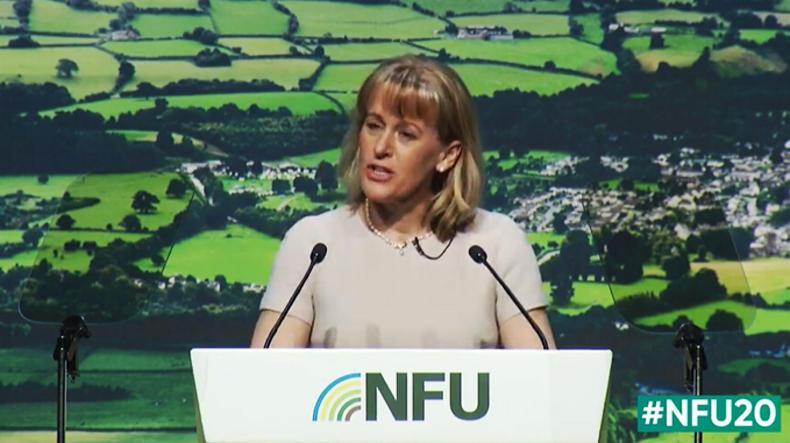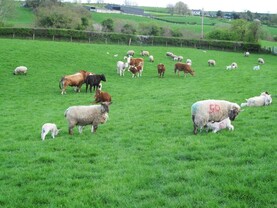In her keynote address, National Farmers’ Union (NFU) president Minette Batters listed various environmental and animal welfare standards in countries that the UK could potentially import food from after the end of the Brexit transition period in January 2021.
“In the US and other countries, there are no federal controls on what are deemed in the UK to be fundamental welfare requirements,” Batters said.
“In Japan, Australia, China, Canada, Brazil, Malaysia and India, the use of antibiotics is permitted for growth promotion.
“In Brazil, farmers don’t need a vet’s prescription for animal medicines, and don’t need to record treatments,” she added.
Batters listed various farming practices which are illegal in the UK but are permitted in other countries.
This included the use of chlorine to wash carcases, the lack of rules on stocking density, biosecurity and veterinary oversight, the ability to feed meat and bone meal and the use of battery cage egg production.
“This isn’t just about chlorinated chicken; this is about a wider principle. We must not tie the hands of British farmers to the highest rung of the standards ladder whilst waving through food imports which may not even reach the bottom rung.”
The Wiltshire farmer reiterated her call for the UK government to set up a trade and standards commission to scrutinise and provide advice on trade negotiations.
The NFU also wants legislation enshrined in the UK government’s agriculture bill to ensure that the proposed commission has authority.
Analysis: Setting the standard
The NFU continues to lobby for legislation on maintaining food import standards in the UK. The next big push will be at a demonstration in Westminster at the end of March.
Some argue that focusing on standards alone will not keep cheap food out. A handful of feedlots and meat factories in Brazil or the US could raise their standards to get access to the UK market.
If they stopped using growth promoters, no longer washed carcases with chlorine, started tagging calves and recorded veterinary medicine treatments, would that suffice for the UK government?
Probably the most effective way of keeping cheap food out of British supermarkets would have been to maintain the UK's place in the EU customs union, but that ship has now sailed.
Remaining part of a customs union would have prevented the UK from doing its own trade deals with other countries. For that reason, it was non-runner with Brexiteers.
So, the focus for the UK farm lobby is on food import standards. Minette Batters is right in pointing out that it goes beyond chlorine washed chicken, however the image does strike a chord with consumers. And keeping the public on side is key.
In her keynote address, National Farmers’ Union (NFU) president Minette Batters listed various environmental and animal welfare standards in countries that the UK could potentially import food from after the end of the Brexit transition period in January 2021.
“In the US and other countries, there are no federal controls on what are deemed in the UK to be fundamental welfare requirements,” Batters said.
“In Japan, Australia, China, Canada, Brazil, Malaysia and India, the use of antibiotics is permitted for growth promotion.
“In Brazil, farmers don’t need a vet’s prescription for animal medicines, and don’t need to record treatments,” she added.
Batters listed various farming practices which are illegal in the UK but are permitted in other countries.
This included the use of chlorine to wash carcases, the lack of rules on stocking density, biosecurity and veterinary oversight, the ability to feed meat and bone meal and the use of battery cage egg production.
“This isn’t just about chlorinated chicken; this is about a wider principle. We must not tie the hands of British farmers to the highest rung of the standards ladder whilst waving through food imports which may not even reach the bottom rung.”
The Wiltshire farmer reiterated her call for the UK government to set up a trade and standards commission to scrutinise and provide advice on trade negotiations.
The NFU also wants legislation enshrined in the UK government’s agriculture bill to ensure that the proposed commission has authority.
Analysis: Setting the standard
The NFU continues to lobby for legislation on maintaining food import standards in the UK. The next big push will be at a demonstration in Westminster at the end of March.
Some argue that focusing on standards alone will not keep cheap food out. A handful of feedlots and meat factories in Brazil or the US could raise their standards to get access to the UK market.
If they stopped using growth promoters, no longer washed carcases with chlorine, started tagging calves and recorded veterinary medicine treatments, would that suffice for the UK government?
Probably the most effective way of keeping cheap food out of British supermarkets would have been to maintain the UK's place in the EU customs union, but that ship has now sailed.
Remaining part of a customs union would have prevented the UK from doing its own trade deals with other countries. For that reason, it was non-runner with Brexiteers.
So, the focus for the UK farm lobby is on food import standards. Minette Batters is right in pointing out that it goes beyond chlorine washed chicken, however the image does strike a chord with consumers. And keeping the public on side is key.






 This is a subscriber-only article
This is a subscriber-only article









SHARING OPTIONS: